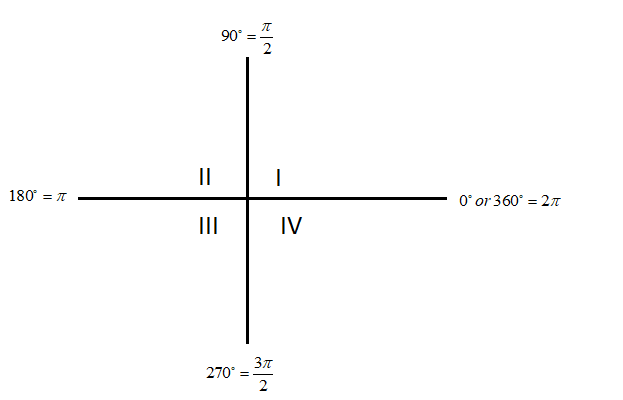Question
Question: If \[a = \sec {2^ \circ }\] and \[b = \sec 2\], then A) \[a = b\] B) \[a < b\] C) \[b < a\] ...
If a=sec2∘ and b=sec2, then
A) a=b
B) a<b
C) b<a
D) 2a=b
Solution
In the given question, we have to apply trigonometric identity to arrive at the solution. Since the question is given in degrees, we can solve it by converting it into radians. We can use the trigonometric ratio table to find out the required value.
Complete step by step solution:
Let us understand with the help of diagram:

The diagram shows four quadrants: I, II, III and IV along-with the degrees and their radians at the end of the line segment. All of the even multiples are the quadrantal angles and are reduced, just like any other fraction.
Now a=sec2∘ is a positive value lying in quadrant I. Therefore, we can conclude that a>0 i.e. it is a positive value.
Since 180∘=π, we can conclude that 1∘=180π
Therefore, multiplying by 2 on both the sides, we will get,
2∘=180π(2)=90π
Hence, we can conclude that:
a=sec2∘=sec90π
Now we are given that b=sec2
We know that 90π<2 since the value of π is approximate 3.14.
So, we can say that:
sec2∘>sec2
⇒b<a
Hence, Option (C) b<a is the correct answer.
Note:
-
We can solve alternatively as follows:
Taking value of π as 3.14, we can calculate that-
90∘=2π=23.14=1.57and
180∘=π=3.14
Now we know that 2lies between the above two values i.e.
1.57⩽2⩽3.14
This means that the value of sec2lies between 90∘ and 180∘ i.e. in Quadrant II where sec<0.
Hence, we can say that b<0.
Since sec2∘ is positive and lying in Quadrant I, we can conclude that:
⇒b<a -
Followings points should be remembered in case of quadrants:
In Quadrant I: All trigonometric functions are positive.
In Quadrant II: Only sin and cosec trigonometric functions are positive.
In Quadrant III: Only tan and cot trigonometric functions are positive.
In Quadrant IV: Only sec and cos trigonometric functions are positive.
